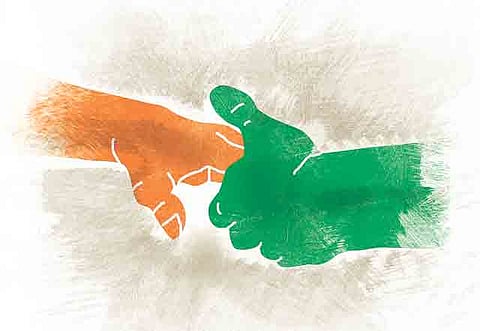Kashmir clouds India-Pakistan talks
Just when the two countries seem to be mending ties, trouble erupts in the disputed territory

With such positive talks taking place between India and Pakistan in Islamabad, the tragic happenings in Kashmir seem more than a coincidence. That youth in the valley are angry is known to all. They have been throwing stones at security forces for more than a year. But why should Kashmir be on the boil when relations between India and Pakistan are on the mend? It is also a strange coincidence that hundreds of devotees should become stranded, having reached Kashmir for the Amarnath Yatra. Apparently, there was no understanding of the problem of unemployment or grievance that had alienated the youth. The political parties only ran each other down, without caring that anger was growing.
The death of one young man at the hands of the security forces has been used to incite people to take to the streets. The Hurriyat Conference has called for the start of "something fresh, something organised". Political parties have also jumped on the bandwagon. All this has developed into a huge protest in four cities — Srinagar, Sopore, Anantnag and Baramulla.
Inept Kashmir Police and members of the Central Reserve Police Force (CRPF), which have only guns, and no lathis or tear gas to tackle protests, have aggravated the situation. The use of force against the protesters agitating against the successive killings was probably too excessive, and the security forces acted without restraint. This is a matter for an inquiry. Yet the fact remains that the extremists in Kashmir strike whenever an atmosphere of goodwill begins to prevail. The pro-India elements have become irrelevant. They, in any case, are too elitist, seldom mixing with common Kashmiris. Chief Minister Omar Farooq Abdullah leads the exclusive club. But their distance from the people only contributes to what is happening in the state, rather than causing it.
The cause is the belief of Gillani and the Hurriyat that violence alone can lead to a solution in Kashmir. That the problem has dragged on for too long and needs to be tackled quickly goes without saying. But the extremists, including the Hurriyat, only stall the issue by instigating violence. They should have taken to the streets to lead the protests in a peaceful manner, thereby focusing attention on the unresolved issue of Kashmir. They should understand that no discussion is possible at gun point.
One welcome development during the talks in Islamabad has been that nobody representing the Indian government has blamed Pakistan for the events in Kashmir. Credit for this must go to the government and the political parties. This means that the talks between the two foreign secretaries have gone some way towards restoring confidence.
I do not know whether home ministers P. Chidambaram and Rahman Malik discussed Kashmir. But at least the two foreign ministers should do so when they meet in Islamabad later this month. India's Army Chief General V.K. Singh has also emphasised the need for "political initiatives" in Kashmir.
The two foreign secretaries, who prepared the agenda for the forthcoming talks between their foreign ministers, did not discuss terrorism. But they did discuss Kashmir. My information is that Indian Foreign Secretary Nirupama agreements reached in the past would be kept. Pakistan's foreign secretary had told me in Delhi that the two countries would build on past agreements. This should put to rest doubts in some Pakistani quarters that a democratic government would not be bound by agreements made by General Pervez Musharraf's regime.
No alternative to peace
Chidambaram, who played to the gallery when he spoke to journalists in Delhi, was more responsible in his remarks in Islamabad. For him to say that he did not doubt Pakistan's intentions was a slap in the face of retired Indian foreign secretaries, who continue to follow the hard line they had taken during their careers. They are openly critical of Singh, who has taken the bold initiative to talk to Pakistan despite criticism from the Bharatiya Janata Party. He, like former prime minister Atal Behari Vajapyee, has realised that there is no alternative to peace.
New Delhi expects more arrests in Pakistan after the disclosures by David Headley, whom the Indian intelligence agencies questioned in Chicago. Singh has reportedly drawn US President Barrack Obama's attention to Headley's confession.
Chidambaram has rightly reminded Pakistanis that India has long ago declared Pakistan a Most Favoured State. If Pakistan were to respond in kind, Chidambaram's ideas on trade and investment between the two countries could be implemented. India, with a bigger market and investment potential, could help to develop Pakistan.
India still expects Pakistan to take action against Lashkar-e-Taiba chief Hafiz Saeed. His vast network made the Mumbai terrorist attacks possible and he will not accept any normalisation of ties.
To further strengthen ties, New Delhi and Islamabad should ensure that their elected leaders meet the opposition leaders when they visit each other's country. Such a move could only help to build confidence.
Kuldip Nayar is a former Indian high commissioner to the United Kingdom and a former Rajya Sabha member.


